Piano Sheet Music
 "...regardless of what you play, the biggest thing is keeping the feel going ..." Wes Montgomery
"...regardless of what you play, the biggest thing is keeping the feel going ..." Wes Montgomery
Bruce Broughton

Bruce Broughton is an American orchestral composer of television, film, and video game scores and concert works. He has composed several highly acclaimed soundtracks over his extensive career, and he has won nine Emmy Awards and has been nominated for an Academy Award for Best Original Score, and has contributed many pieces to music archives. Broughton is currently a lecturer in composition at the UCLA.
Henry VIII

Henry VIII (28 June 1491 – 28 January 1547) was King of England from 22 April 1509 until his death in 1547. Henry is best known for his six marriages, including his efforts to have his first marriage (to Catherine of Aragon) annulled. His disagreement with Pope Clement VII about such an annulment led Henry to initiate the English Reformation, separating the Church of England from papal authority. He appointed himself Supreme Head of the Church of England and dissolved convents and monasteries, for which he was excommunicated. Henry is also known as "the father of the Royal Navy," as he invested heavily in the navy, increasing its size from a few to more than 50 ships, and established the Navy Board.
Music theory

Music theory is the study of the practices and possibilities of music. The Oxford Companion to Music describes three interrelated uses of the term "music theory"
Beethoven

Ludwig van Beethoven (16 December 1770 - 26 March 1827) was a German composer and pianist. He was a crucial figure in the transitional period between the Classical and Romantic eras in Western classical music, and remains one of the most respected and influential composers of all time.
Born in Bonn, then in the Electorate of Cologne (now in modern-day Germany), he moved to Vienna in his early twenties and settled there, studying with Joseph Haydn and quickly gaining a reputation as a virtuoso pianist. Beethoven's hearing gradually deteriorated beginning in his twenties, yet he continued to compose masterpieces, and to conduct and perform, even after he was completely deaf.
Born in Bonn, then in the Electorate of Cologne (now in modern-day Germany), he moved to Vienna in his early twenties and settled there, studying with Joseph Haydn and quickly gaining a reputation as a virtuoso pianist. Beethoven's hearing gradually deteriorated beginning in his twenties, yet he continued to compose masterpieces, and to conduct and perform, even after he was completely deaf.
Georges Bizet

Georges Bizet (25 October 1838 – 3 June 1875) was a French composer and pianist of the Romantic era. He is best known for the opera Carmen.
Bizet was born at 26 rue de la Tour d'Auvergne in the 9th arrondissement of Paris in 1838. He was registered with the legal name Alexandre César Léopold Bizet, but he was baptised on 16 March 1840 with the first name Georges, and he was always known thereafter as Georges Bizet. His father Adolphe Armand Bizet (1810-86) was an amateur singer and composer, and his mother, Aimée Léopoldine Joséphine née Delsarte (1814-61), was the sister of the famous singing teacher François Delsarte.
He entered the Paris Conservatory of Music on 9 October 1848, a fortnight before his tenth birthday. His teachers there were Pierre Zimmermann (fugue and counterpoint; often assisted by his son-in-law Charles Gounod), Antoine François Marmontel (piano), François Benoist (organ) and, on Zimmermann's death, Fromental Halévy, whose daughter he himself later married. He won first prizes for organ and fugue in 1855 and completed his earliest compositions.
His first symphony, the Symphony in C, was written in November 1855, when he was seventeen, evidently as a student assignment. It was unknown to the world until 1933, when it was discovered in the archives of the Paris Conservatory library. Upon its first performance in 1935, it was immediately hailed as a junior masterwork and a welcome addition to the early Romantic period repertoire. The symphony bears a stylistic resemblance to the first symphony of Gounod, first played earlier in the same year, and which Bizet had arranged for two pianos although present-day listeners may discern a similarity to music of Franz Schubert, whose work was little known in France at the time the symphony was written.
In 1857, a setting of the one-act operetta Le docteur Miracle won him a share in a prize offered by Jacques Offenbach. He also won the music composition scholarship of the Prix de Rome, the conditions of which required him to study in Rome for three years. There, his talent developed as he wrote such works as the opera buffa Don Procopio (1858-59). There he also composed his only major sacred work, Te Deum (1858), which he submitted to the Prix Rodrigues competition, a contest for Prix de Rome winners only. Bizet failed to win the Prix Rodrigues, and the Te Deum score remained unpublished until 1971. He made two attempts to write another symphony in 1859, but destroyed the manuscripts in December of that year. Apart from this period in Rome, Bizet lived in the Paris area all his life.
Shortly after leaving Rome in July 1860, but while still touring in Italy, he had the idea of writing a symphony in which each of the four movements would be a musical evocation of a different Italian city – Rome, Venice, Florence and Naples. On hearing of his mother's serious illness he cut short his Italian travels and returned to Paris in September 1860; she died a year later. The Scherzo of the symphony was completed by November 1861, but it was not until 1866 that the first version of the whole symphony was written. He subjected it to a number of revisions through to 1871, but died before ever producing what he considered the definitive version. For this reason, the work is sometimes described as "unfinished", but this is an inaccurate description as it was fully scored. It was published in 1880 as the Roma Symphony.
Bizet was born at 26 rue de la Tour d'Auvergne in the 9th arrondissement of Paris in 1838. He was registered with the legal name Alexandre César Léopold Bizet, but he was baptised on 16 March 1840 with the first name Georges, and he was always known thereafter as Georges Bizet. His father Adolphe Armand Bizet (1810-86) was an amateur singer and composer, and his mother, Aimée Léopoldine Joséphine née Delsarte (1814-61), was the sister of the famous singing teacher François Delsarte.
He entered the Paris Conservatory of Music on 9 October 1848, a fortnight before his tenth birthday. His teachers there were Pierre Zimmermann (fugue and counterpoint; often assisted by his son-in-law Charles Gounod), Antoine François Marmontel (piano), François Benoist (organ) and, on Zimmermann's death, Fromental Halévy, whose daughter he himself later married. He won first prizes for organ and fugue in 1855 and completed his earliest compositions.
His first symphony, the Symphony in C, was written in November 1855, when he was seventeen, evidently as a student assignment. It was unknown to the world until 1933, when it was discovered in the archives of the Paris Conservatory library. Upon its first performance in 1935, it was immediately hailed as a junior masterwork and a welcome addition to the early Romantic period repertoire. The symphony bears a stylistic resemblance to the first symphony of Gounod, first played earlier in the same year, and which Bizet had arranged for two pianos although present-day listeners may discern a similarity to music of Franz Schubert, whose work was little known in France at the time the symphony was written.
In 1857, a setting of the one-act operetta Le docteur Miracle won him a share in a prize offered by Jacques Offenbach. He also won the music composition scholarship of the Prix de Rome, the conditions of which required him to study in Rome for three years. There, his talent developed as he wrote such works as the opera buffa Don Procopio (1858-59). There he also composed his only major sacred work, Te Deum (1858), which he submitted to the Prix Rodrigues competition, a contest for Prix de Rome winners only. Bizet failed to win the Prix Rodrigues, and the Te Deum score remained unpublished until 1971. He made two attempts to write another symphony in 1859, but destroyed the manuscripts in December of that year. Apart from this period in Rome, Bizet lived in the Paris area all his life.
Shortly after leaving Rome in July 1860, but while still touring in Italy, he had the idea of writing a symphony in which each of the four movements would be a musical evocation of a different Italian city – Rome, Venice, Florence and Naples. On hearing of his mother's serious illness he cut short his Italian travels and returned to Paris in September 1860; she died a year later. The Scherzo of the symphony was completed by November 1861, but it was not until 1866 that the first version of the whole symphony was written. He subjected it to a number of revisions through to 1871, but died before ever producing what he considered the definitive version. For this reason, the work is sometimes described as "unfinished", but this is an inaccurate description as it was fully scored. It was published in 1880 as the Roma Symphony.
Rachmaninoff

Sergei Vasilievich Rachmaninoff (1 April 1873 - 28 March 1943) was a Russian composer, pianist, and conductor. He was one of the finest pianists of his day and, as a composer, the last great representative of Russian late Romanticism in classical music. Early influences of Tchaikovsky, Rimsky-Korsakov and other Russian composers gave way to a thoroughly personal idiom which included a pronounced lyricism, expressive breadth, structural ingenuity and a tonal palette of rich, distinctive orchestral colors.
Understandably, the piano figures prominently in Rachmaninoff's compositional output, either as a solo instrument or as part of an ensemble. He made it a point, however, to use his own skills as a performer to explore fully the expressive possibilities of the instrument. Even in his earliest works, he revealed a sure grasp of idiomatic piano writing and a striking gift for melody. In some of his early orchestral pieces he showed the first signs of a talent for tone painting, which he would perfect in The Isle of the Dead, and he began to show a similar penchant for vocal writing in two early sets of songs, Opp. 4 and 8. Rachmaninoff's masterpiece, however, is his choral symphony The Bells, in which all of his talents are fused and unified.
Rachmaninoff sometimes felt threatened by the success of modernists such as Scriabin and Prokofiev and wondered whether to cease composing even before he left Russia. His musical philosophy was rooted in the Russian spiritual tradition, where the role of the artist was to create beauty and to speak the truth from the depths of his heart. In his last major interview, in 1941, he admitted his music, like Russian music, was a product of his temperament. He said, on another occasion, "The new kind of music seems to create not from the heart but from the head. Its composers think rather than feel. They have not the capacity to make their works exalt—they meditate, protest, analyze, reason, calculate and brood, but they do not exalt."
Understandably, the piano figures prominently in Rachmaninoff's compositional output, either as a solo instrument or as part of an ensemble. He made it a point, however, to use his own skills as a performer to explore fully the expressive possibilities of the instrument. Even in his earliest works, he revealed a sure grasp of idiomatic piano writing and a striking gift for melody. In some of his early orchestral pieces he showed the first signs of a talent for tone painting, which he would perfect in The Isle of the Dead, and he began to show a similar penchant for vocal writing in two early sets of songs, Opp. 4 and 8. Rachmaninoff's masterpiece, however, is his choral symphony The Bells, in which all of his talents are fused and unified.
Rachmaninoff sometimes felt threatened by the success of modernists such as Scriabin and Prokofiev and wondered whether to cease composing even before he left Russia. His musical philosophy was rooted in the Russian spiritual tradition, where the role of the artist was to create beauty and to speak the truth from the depths of his heart. In his last major interview, in 1941, he admitted his music, like Russian music, was a product of his temperament. He said, on another occasion, "The new kind of music seems to create not from the heart but from the head. Its composers think rather than feel. They have not the capacity to make their works exalt—they meditate, protest, analyze, reason, calculate and brood, but they do not exalt."
Lionel Richie

Lionel Brockman Richie, Jr. (born June 20, 1949) is an Academy Award and Grammy award-winning American singer, songwriter, record producer, and occasional actor, who has sold more than 100 million records.
He released his self-titled debut in 1982. The album hit #3 on the music charts and sold over 4 million copies. His 1983 follow up album, Can't Slow Down, sold over twice as many copies and won the Grammy Award for the Album of the Year in 1984. His third album, Dancing on the Ceiling, which was released in 1986, spawned such hits as "Say You, Say Me", "Dancing on the Ceiling," and "Se La", but it also signified the end of his large commercial success.
In 2002, Richie's song "Running with the Night" was featured on the Rockstar North video game Grand Theft Auto: Vice City though the song was removed from later versions of the game. In 2004, he appeared on Canadian Idol as his songs were featured during a Canadian Idol week.
In November 2005, Lionel Richie performed with Kenny Rogers on a CMT Crossroads special. The show gave an informative insight into their friendship both in and out of the music world. Richie was also the headliner at a 2000 Fourth of July tribute concert with Fantasia Barrino at the Philadelphia Museum of Art. Richie released his eighth studio album entitled " Coming Home" on September 12, 2006. The first single of the album was "I Call It Love" and was premiered in July 2006, becoming his biggest hit in the U.S. in ten years. The album was an incredible success for Richie in the United States, peaking at #6. His adopted daughter Nicole Richie stars in the music video for this track.
On May 2, 2008, Lionel Richie was the 21st recipient of the George and Ira Gershwin Lifetime Achievement Award at UCLA's annual Spring Sing. In accepting the award, Richie said: "Forget about surviving 30 some odd years in the music business, Lionel Richie survived 27 years of Nicole Richie".
He released his self-titled debut in 1982. The album hit #3 on the music charts and sold over 4 million copies. His 1983 follow up album, Can't Slow Down, sold over twice as many copies and won the Grammy Award for the Album of the Year in 1984. His third album, Dancing on the Ceiling, which was released in 1986, spawned such hits as "Say You, Say Me", "Dancing on the Ceiling," and "Se La", but it also signified the end of his large commercial success.
In 2002, Richie's song "Running with the Night" was featured on the Rockstar North video game Grand Theft Auto: Vice City though the song was removed from later versions of the game. In 2004, he appeared on Canadian Idol as his songs were featured during a Canadian Idol week.
In November 2005, Lionel Richie performed with Kenny Rogers on a CMT Crossroads special. The show gave an informative insight into their friendship both in and out of the music world. Richie was also the headliner at a 2000 Fourth of July tribute concert with Fantasia Barrino at the Philadelphia Museum of Art. Richie released his eighth studio album entitled " Coming Home" on September 12, 2006. The first single of the album was "I Call It Love" and was premiered in July 2006, becoming his biggest hit in the U.S. in ten years. The album was an incredible success for Richie in the United States, peaking at #6. His adopted daughter Nicole Richie stars in the music video for this track.
On May 2, 2008, Lionel Richie was the 21st recipient of the George and Ira Gershwin Lifetime Achievement Award at UCLA's annual Spring Sing. In accepting the award, Richie said: "Forget about surviving 30 some odd years in the music business, Lionel Richie survived 27 years of Nicole Richie".
Fariborz Lachini
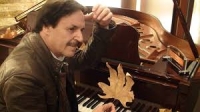
He started his career in Iran writing music for children, creating "Avaz Faslha va Rangha" at the age of 18 which caught the attention of royal family of the time. The title of national Iranian TV's children programming for more than two decades, was one of his earlier works. Before Iran's Islamic Revolution, he also created music for some of Iran's pop icons.
After the Islamic Revolution he moved to Europe to study Musicology in the Universite de Paris – Sorbonne. It was then that his music became influenced by the European styles. He returned home and created one of the best loved contemporary solo piano albums of all in Iran with a unique style, a combination of Persian and European Romantic styles called "Paeez Talaee", also known as Golden Autumn, which has been the number-one seller for years in Iran and has attracted fans from all around the world
After the Islamic Revolution he moved to Europe to study Musicology in the Universite de Paris – Sorbonne. It was then that his music became influenced by the European styles. He returned home and created one of the best loved contemporary solo piano albums of all in Iran with a unique style, a combination of Persian and European Romantic styles called "Paeez Talaee", also known as Golden Autumn, which has been the number-one seller for years in Iran and has attracted fans from all around the world
Traditional

Hangad
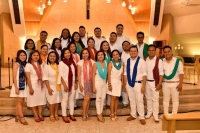
Hangád (Tagalog: "yearning" or "desire") is an inspirational vocal ensemble known for songs like Pananatili and Panunumpâ (covered by pop singer Carol Banawa). They have also recorded albums which are co-produced with the Jesuit Music Ministry (JMM), the musical arm of Jesuit Communications Foundation (JesCom) of the Philippine Province of the Society of Jesus.].
In 2006, Hangad won an Awit Award for Best Inspirational or Religious Song.
In 2006, Hangad won an Awit Award for Best Inspirational or Religious Song.
Billie Holiday
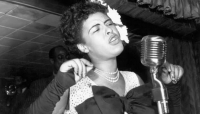
Billie Holiday, American singer, songwriter, composer. Nicknamed "Lady Day", Billie Holiday is the daughter of a traveling musician father. His childhood, deprived of education, included a poor life. She was raped at the age of 11 and was given boarding at a Catholic school.
Jamey Aebersold

Jamey Aebersold (born July 21, 1939 in New Albany, Indiana) is an American jazz saxophonist and music educator. His "Play-A-Long" series of instructional book and CD collections, using the chord-scale system, the first of which was released in 1967, are an internationally renowned resource for jazz education. As of 2009, 126 of these collections have been published by Aebersold, who currently teaches musical improvisation at the University of Louisville. He is also an adept pianist, bassist, and banjoist.
Crash Test Dummies

The Crash Test Dummies are a Canadian folk rock band from Winnipeg, Manitoba, best known for their 1993 single "Mmm Mmm Mmm Mmm". Since 2001, the only consistent members of the band have been lead singer Brad Roberts and vocalist Ellen Reid, since the rest of the band members have been busy with other projects and live far from Roberts' home in New York City.
Johann Strauss Jr.

Johann Strauss II (born Johann Baptist Strauss; 25 October 1825 – 3 June 1899), also known as Johann Strauss Jr., the Younger, the Son (German: Sohn), son of Johann Strauss I, was an Austrian composer of light music, particularly dance music and operettas. He composed over 500 waltzes, polkas, quadrilles, and other types of dance music, as well as several operettas and a ballet. In his lifetime, he was known as "The Waltz King", and was largely responsible for the popularity of the waltz in Vienna during the 19th century. Some of Johann Strauss's most famous works include "The Blue Danube", "Kaiser-Walzer" (Emperor Waltz), "Tales from the Vienna Woods", and the "Tritsch-Tratsch-Polka". Among his operettas, Die Fledermaus and Der Zigeunerbaron are the best known.
Chopin

Frédéric Chopin (1 March 1810 – 17 October 1849) was a Polish composer and virtuoso pianist of the Romantic period. He is widely regarded as the greatest Polish composer, and ranks as one of music's greatest tone poets.
He was born in the village of Żelazowa Wola, in the Duchy of Warsaw, to a Polish mother and French-expatriate father, and in his early life was regarded as a child-prodigy pianist. In November 1830, at the age of 20, Chopin went abroad; following the suppression of the Polish November Uprising of 1830–31, he became one of many expatriates of the Polish "Great Emigration."
In Paris, he made a comfortable living as a composer and piano teacher, while giving few public performances. A Polish patriot,
Chopin's extant compositions were written primarily for the piano as a solo instrument. Though technically demanding, Chopin's style emphasizes nuance and expressive depth rather than virtuosity. Chopin invented musical forms such as the ballade and was responsible for major innovations in forms such as the piano sonata, waltz, nocturne, étude, impromptu and prelude. His works are mainstays of Romanticism in 19th-century classical music.
He was born in the village of Żelazowa Wola, in the Duchy of Warsaw, to a Polish mother and French-expatriate father, and in his early life was regarded as a child-prodigy pianist. In November 1830, at the age of 20, Chopin went abroad; following the suppression of the Polish November Uprising of 1830–31, he became one of many expatriates of the Polish "Great Emigration."
In Paris, he made a comfortable living as a composer and piano teacher, while giving few public performances. A Polish patriot,
Chopin's extant compositions were written primarily for the piano as a solo instrument. Though technically demanding, Chopin's style emphasizes nuance and expressive depth rather than virtuosity. Chopin invented musical forms such as the ballade and was responsible for major innovations in forms such as the piano sonata, waltz, nocturne, étude, impromptu and prelude. His works are mainstays of Romanticism in 19th-century classical music.
Jimmy Rowles

James George Hunter, known professionally as Jimmy Rowles, was an American jazz pianist, vocalist, and composer. As a bandleader and accompanist, he explored multiple styles including swing and cool jazz.
Eldo di Lazzaro

Eldo Di Lazzaro Singer Born: February 21, 1902, Trapani, Italy Died: November 29, 1968, Milan, Italy Parents: Adelaide Doglio, Gaetano Di Lazzaro Songs Chitarro Romano la Piccinina Reginella Campagnola
Gerald Marks
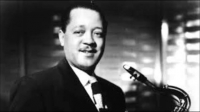
Gerald Marks (October 13, 1900 – January 27, 1997) was an American composer from Saginaw, Michigan. He was best known for the song "All of Me" which he co-wrote with Seymour Simons and has been recorded about 2,000 times. He also wrote the songs "That's What I Want for Christmas" for the film Stowaway starring Shirley Temple, and "Is It True What They Say About Dixie" recorded by Al Jolson and Rudy Vallee.
The success of his song "All of Me" led him to become a member of ASCAP, and he remained active in the organization for decades, serving on its board of directors from 1970 to 1981.
Gerald Marks was married to Edna Berger, a successful newspaper woman and labor organizer. She preceded him in death.
The success of his song "All of Me" led him to become a member of ASCAP, and he remained active in the organization for decades, serving on its board of directors from 1970 to 1981.
Gerald Marks was married to Edna Berger, a successful newspaper woman and labor organizer. She preceded him in death.
Joe Hisaishi

Mamoru Fujisawa (藤澤 守 Fujisawa Mamoru?), known professionally as Joe Hisaishi (久石 譲 Hisaishi Jō?, born December 6, 1950), is a composer and director known for over 100 film scores and solo albums dating back to 1981.
While possessing a stylistically distinct sound, Hisaishi's music has been known to explore and incorporate different genres, including minimalist, experimental electronic, European classical, and Japanese classical. Lesser known are the other musical roles he plays; he is also a typesetter, author, arranger, and head of an orchestra.
He is best known for his work with animator Hayao Miyazaki, having composed scores for many of his films including Nausicaä of the Valley of the Wind (1984), My Neighbor Totoro (1988), Princess Mononoke (1997), Spirited Away (2001), Howl's Moving Castle (2004) and Ponyo (2008). He is also recognized for the soundtracks he has provided for filmmaker 'Beat' Takeshi Kitano, including Dolls (2002), Kikujiro (1999), Hana-bi (1997), Kids Return (1996), Sonatine (1993).
While possessing a stylistically distinct sound, Hisaishi's music has been known to explore and incorporate different genres, including minimalist, experimental electronic, European classical, and Japanese classical. Lesser known are the other musical roles he plays; he is also a typesetter, author, arranger, and head of an orchestra.
He is best known for his work with animator Hayao Miyazaki, having composed scores for many of his films including Nausicaä of the Valley of the Wind (1984), My Neighbor Totoro (1988), Princess Mononoke (1997), Spirited Away (2001), Howl's Moving Castle (2004) and Ponyo (2008). He is also recognized for the soundtracks he has provided for filmmaker 'Beat' Takeshi Kitano, including Dolls (2002), Kikujiro (1999), Hana-bi (1997), Kids Return (1996), Sonatine (1993).
Dave Mason

David Thomas Mason (born 10 May 1946) is an English singer-songwriter and guitarist from Worcester, who first found fame with the rock band Traffic. Over the course of his career, Mason has played and recorded with many notable pop and rock musicians, including Paul McCartney, George Harrison, the Rolling Stones, Jimi Hendrix, Eric Clapton, Michael Jackson, David Crosby, Graham Nash, Steve Winwood, Fleetwood Mac, Delaney & Bonnie, Leon Russell and Cass Elliot. One of Mason's best known songs is "Feelin' Alright", recorded by Traffic in 1968 and later by many other performers, including Joe Cocker, whose version of the song was a hit in 1969. For Traffic, he also wrote "Hole in My Shoe", a psychedelic pop song that became a hit in its own right. "We Just Disagree", Mason's 1977 solo US hit, written by Jim Krueger, has become a staple of US classic hits and adult contemporary radio playlists.
Jules de Corte

Julius "Jules" de Corte (29 March 1924 – 16 February 1996) was probably one of the most famous blind singer-songwriters from the Netherlands.Julius de Corte was born on 29 March 1924 in Deurne to Peer de Corte and Anna van Eijk. His father had socialist ideals and in 1923 led a strike, the failure of which had a significant impact on the already poor family. At fourteen months, Jules developed a middle ear infection, which eventually led to him becoming blind. He would spend the rest of his childhood in two Catholic institutions for the blind in Grave, which provided him with a good education but no affection. In the last year of the Second World War, allied soldiers were accommodated in the institute and De Corte sang songs for them and played the piano.[1
Janis Joplin

Janis Lyn Joplin (/ˈdʒɒplɪn/; January 19, 1943 – October 4, 1970) was an American singer-songwriter who first rose to fame in the mid 1960s as the lead singer of the psychedelic/acid rock band Big Brother and the Holding Company, and later as a solo artist with her own backing groups, The Kozmic Blues Band and The Full Tilt Boogie Band.
Her first ever large scale public performance was at the Monterey Pop Festival, which led to her becoming very popular and one of the major attractions at the Woodstock festival and the Festival Express train tour. Joplin charted five singles; other popular songs include: "Down on Me," "Summertime," "Piece of My Heart," "Ball 'n' Chain," "Maybe," "To Love Somebody," "Kozmic Blues," "Work Me, Lord," "Cry Baby," "Mercedes Benz," and her only number one hit, "Me and Bobby McGee."
Her first ever large scale public performance was at the Monterey Pop Festival, which led to her becoming very popular and one of the major attractions at the Woodstock festival and the Festival Express train tour. Joplin charted five singles; other popular songs include: "Down on Me," "Summertime," "Piece of My Heart," "Ball 'n' Chain," "Maybe," "To Love Somebody," "Kozmic Blues," "Work Me, Lord," "Cry Baby," "Mercedes Benz," and her only number one hit, "Me and Bobby McGee."
Fred Wesley
Fred Wesley is an American trombonist who worked with James Brown in the 1960s and 1970s and Parliament-Funkadelic in the second half of the 1970s.
Haven Gillespie

James Lamont Gillespie (February 6, 1888 – March 14, 1975) pen name Haven Gillespie, was an American Tin Pan Alley composer and lyricist. He was the writer of "You Go to My Head", "Honey", "By the Sycamore Tree", "That Lucky Old Sun", "Breezin' Along With The Breeze", "Right or Wrong," "Beautiful Love", "Drifting and Dreaming", and "Louisiana Fairy Tale" (Fats Waller's recording of which was used as the first theme song in the PBS Production of This Old House), each song in collaboration with other people such as Beasley Smith, Ervin R. Schmidt, Richard A. Whiting, Wayne King, and Loyal Curtis. He also wrote the seasonal standard "Santa Claus Is Comin' to Town".
Peter Allen

Peter Allen (10 February 1944 – 18 June 1992) was an Australian songwriter and entertainer. His songs were made popular by many recording artists, including Melissa Manchester and Olivia Newton-John, Elkie Brooks, and one, Arthur's Theme, won the Academy Award. In addition to recording many albums, he enjoyed a cabaret and concert career, including appearing at Radio City Music Hall riding a camel. His marriage to Liza Minnelli ended in divorce.
Carlos Almaran

Panamanian songwriter Carlos Eleta Almarán. It was written after the death of his brother's wife. It is also part of the soundtrack of a 1956 Mexican film of the same name starring Libertad Lamarque. The song tells of a man's suffering after his love has disappeared. It holds the world record to be the most popular song to be translated and sung across the world in various languages by various singers from the Americas, Europe, Asia, and Africa.
Keiki Kobayashi

Keiki Kobayashi (小林 啓樹) is an ex-Namco sound composer and musician known for his work in the Ace Combat and Soulcalibur series who went freelance in 2014. His contributions to games involving or otherwise incorporating Capcom began shortly before this.
LiSA

Risa Oribe (織部 里沙, Oribe Risa, born 24 June 1987), better known by her stage name LiSA, is a Japanese singer, songwriter and lyricist from Seki, Gifu, signed to Sacra Music under Sony Music Artists.After aspiring to become a musician early in life, she started her musical career as the vocalist of the indie band Chucky. Following Chucky's disbandment in 2005, LiSA moved to Tokyo to pursue a solo career, making her major debut in 2010 singing songs for the anime television series Angel Beats! as one of two vocalists for the fictional band Girls Dead Monster. In April 2011, she made her solo debut with the release of her mini-album Letters to U. She performed at Animelo Summer Live in August 2010, Anime Expo in 2012, and is a regular guest at Anime Festival Asia.
George Canseco

George Masangkay Canseco (April 23, 1934 – November 19, 2004) was a Filipino composer of numerous popular Filipino songs .Canseco wrote the classic "Kapantay Ay Langit", a theme from the award winning motion picture sung by Amapola. It also had an English version titled "You're All I Love" that was sung by American singer Vic Dana that included some Tagalog lines. The song won the Manila Film Festival Best Song Of The Year Award in 1972. Canseco followed it with an English song entitled "Songs" exclusively for "Songs and Amapola" under the Vicor Music Corporation Pioneer Label. Canseco's best-known composition, however, was "Child", the English-language version of Freddie Aguilar's signature song "Anák". He wrote for Sharon Cuneta and Basil Valdez, and his songs were also recorded by Regine Velasquez, Zsa Zsa Padilla, Pilita Corrales, Martin Nievera, and Kuh Ledesma. Rey Valera was a lyricist of two of Canseco's songs.
Dave Brubeck
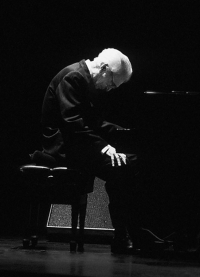
David Warren Brubeck (born December 6, 1920 in Concord, California), better known as Dave Brubeck, is an American jazz pianist. Regarded as a genius in his field, he has written a number of jazz standards, including "In Your Own Sweet Way" and "The Duke". Brubeck's style ranges from refined to bombastic, reflecting his mother's attempts at classical training and his improvisational skills. Much of his music employs unusual time signatures.
His long-time musical partner, alto saxophonist Paul Desmond, wrote the Dave Brubeck Quartet's most famous piece, "Take Five", which is in 5/4 time and has endured as a jazz classic. Brubeck experimented with time signatures through much of his career, recording "Pick Up Sticks" in 6/4, "Unsquare Dance" in 7/4, and "Blue Rondo à la Turk" in 9/8. He also provided music for the TV animated miniseries "This Is America, Charlie Brown".
His long-time musical partner, alto saxophonist Paul Desmond, wrote the Dave Brubeck Quartet's most famous piece, "Take Five", which is in 5/4 time and has endured as a jazz classic. Brubeck experimented with time signatures through much of his career, recording "Pick Up Sticks" in 6/4, "Unsquare Dance" in 7/4, and "Blue Rondo à la Turk" in 9/8. He also provided music for the TV animated miniseries "This Is America, Charlie Brown".
Tchaikovsky

Pyotr Il'yich Tchaikovsky (May 7 1840 â November 6 1893) was a Russian composer of the Romantic era. While not part of the nationalistic music group known as "The Five", Tchaikovsky wrote music which, in the opinion of Harold Schonberg, was distinctly Russian: plangent, introspective, with modally-inflected melody and harmony.
Aesthetically, Tchaikovsky remained open to all aspects of Saint Petersburg musical life. He was impressed by Serov and Balakirev as well as the classical values upheld by the conservatory. Both the progressive and conservative camps in Russian music at the time attempted to win him over. Tchaikovsky charted his compositional course between these two factions, retaining his individuality as a composer as well as his Russian identity. In this he was influenced by the ideals of his teacher Nikolai Rubinstein and Nikolai's brother Anton.
Tchaikovsky's musical cosmopolitanism led him to be favored by many Russian music-lovers over the "Russian" harmonies and styles of Mussorgsky, Borodin and Rimsky-Korsakov.
Nonetheless he frequently adapted Russian traditional melodies and dance forms in his music, which enhanced his success in his home country. The success in St. Petersburg at the premiere of his Third Orchestral Suite may have been due in large part to his concluding the work with a polonaise. He also used a polonaise for the final movement of his Third Symphony.
Aesthetically, Tchaikovsky remained open to all aspects of Saint Petersburg musical life. He was impressed by Serov and Balakirev as well as the classical values upheld by the conservatory. Both the progressive and conservative camps in Russian music at the time attempted to win him over. Tchaikovsky charted his compositional course between these two factions, retaining his individuality as a composer as well as his Russian identity. In this he was influenced by the ideals of his teacher Nikolai Rubinstein and Nikolai's brother Anton.
Tchaikovsky's musical cosmopolitanism led him to be favored by many Russian music-lovers over the "Russian" harmonies and styles of Mussorgsky, Borodin and Rimsky-Korsakov.
Nonetheless he frequently adapted Russian traditional melodies and dance forms in his music, which enhanced his success in his home country. The success in St. Petersburg at the premiere of his Third Orchestral Suite may have been due in large part to his concluding the work with a polonaise. He also used a polonaise for the final movement of his Third Symphony.
Guns N' Roses

Guns N 'Roses is an American rock band founded in 1985 in Los Angeles, California. Axl Rose, Slash, Izzy Stradlin, Duff McKagan, and Steven , Genres: Hard rock, Heavy metal, Blues rock, Glam rock They started their music life in Los Angeles, California, USA (1985) Albums: Appetite for Destruction, Use Your Illusion I
Bleach

Ichigo Kurosaki never asked for the ability to see ghosts -- he was born with the gift. When his family is attacked by a Hollow -- a malevolent lost soul -- Ichigo becomes a Soul Reaper, dedicating his life to protecting the innocent and helping the tortured spirits themselves find peace.
Alfredo Votta

Alfredo Votta is a wonderful composer, and several new pieces of his are now available on the Corpus Christi Watershed page that has Mass Parts in English, Latin, Greek, Spanish, & Portuguese for organ & voice.
Speelklaar
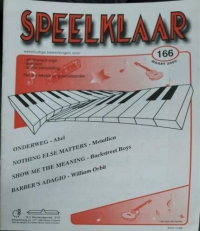
Ready to Play- Easy Piano and Keyboard Edits - Music Score. Fast and reliable worldwide.
Don McLean
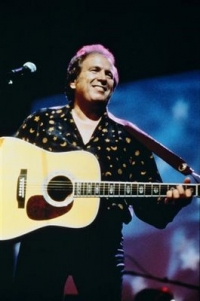
Donald McLean (born October 2, 1945 in New Rochelle, New York) is an American singer-songwriter. He is most famous for his 1971 album American Pie, containing the renowned songs American Pie and Vincent.
The McLean clan traces its roots to the Isle of Iona in the Scottish Hebrides. Both Don’s grandfather and father were named Donald McLean which sometimes led to confusion as Don was also christened Donald McLean. Don’s mother’s family, the Buccis, came from Abruzzi in southern Italy. They left Italy and settled in Port Chester, N.Y. at the end of the 19th century.
The McLean clan traces its roots to the Isle of Iona in the Scottish Hebrides. Both Don’s grandfather and father were named Donald McLean which sometimes led to confusion as Don was also christened Donald McLean. Don’s mother’s family, the Buccis, came from Abruzzi in southern Italy. They left Italy and settled in Port Chester, N.Y. at the end of the 19th century.
pat metheny
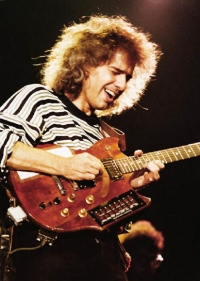
Patrick Bruce "Pat" Metheny (/məˈθiːni/ mə-thee-nee; born August 12, 1954) is an American jazz guitarist and composer.
He is the leader of the Pat Metheny Group and is also involved in duets, solo works and other side projects. His style incorporates elements of progressive and contemporary jazz, post-bop, latin jazz and jazz fusion. Pat Metheny has three gold albums and 20 Grammy Awards. He is the brother of jazz flugelhornist and journalist Mike Metheny.
He is the leader of the Pat Metheny Group and is also involved in duets, solo works and other side projects. His style incorporates elements of progressive and contemporary jazz, post-bop, latin jazz and jazz fusion. Pat Metheny has three gold albums and 20 Grammy Awards. He is the brother of jazz flugelhornist and journalist Mike Metheny.
Yoshiki Hayashi
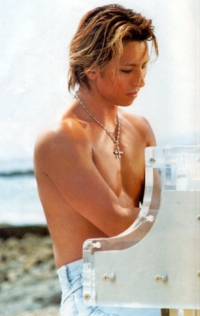
Yoshiki Hayashi (born November 20, 1965, in Tateyama, Japan) is a musician, songwriter and producer. Throughout his professional career usually referred to by his given name only, he is primarily known for co-founding the popular rock band X Japan, for which he plays drums and piano, along with writing most of the music. He is currently involved with the supergroup S.K.I.N..
Yoshiki formed X Japan with vocalist Toshimitsu "Toshi" Deyama in 1982. Four years later, he founded his own independent label, Extasy Records, in order to issue the band's music. Their breakthrough came in 1989 with the release of the Blue Blood album. After three more albums and several tours, the group broke up in 1997 but releases of arranged material and reissues continue until today.
After X Japan disbanded, his next major endeavor was expected to become Violet UK, but the release of a debut album has since been postponed repeatedly. Beside a symphonic concert performed in 2002 and released on DVD in 2005 (which contained arrangements of old X Japan songs along with music supposedly created for Violet UK), no major publication of the project has yet surfaced.
In 2007, X Japan reunited. On October 22, 2007 they appeared together for the first time in over 10 years at a public filming of the promotion video for their new single "I.V." which was created for the movie Saw IV.
Yoshiki formed X Japan with vocalist Toshimitsu "Toshi" Deyama in 1982. Four years later, he founded his own independent label, Extasy Records, in order to issue the band's music. Their breakthrough came in 1989 with the release of the Blue Blood album. After three more albums and several tours, the group broke up in 1997 but releases of arranged material and reissues continue until today.
After X Japan disbanded, his next major endeavor was expected to become Violet UK, but the release of a debut album has since been postponed repeatedly. Beside a symphonic concert performed in 2002 and released on DVD in 2005 (which contained arrangements of old X Japan songs along with music supposedly created for Violet UK), no major publication of the project has yet surfaced.
In 2007, X Japan reunited. On October 22, 2007 they appeared together for the first time in over 10 years at a public filming of the promotion video for their new single "I.V." which was created for the movie Saw IV.
Yiruma

Yiruma (born February 15 1978, Seoul, Korea) is a South Korean piano music composer. He is married to Son Hye-im.
Yiruma is well-known throughout the world, and his albums are sold all over Asia, as well as the United States and Europe. His most famous pieces are "Kiss the Rain", and also "River Flows in You". These pieces are widely mistaken for being associated with the movie Twilight. Although he formerly held dual citizenship as a citizen of the United Kingdom and South Korea, in July 2006 he gave up his British citizenship and entered the Republic of Korea Navy to begin his military service, which is compulsory for all male South Koreans. He has lived in Osaka, Japan for 5 years to promote album sales before giving up his dual citizenship.
Yiruma is well-known throughout the world, and his albums are sold all over Asia, as well as the United States and Europe. His most famous pieces are "Kiss the Rain", and also "River Flows in You". These pieces are widely mistaken for being associated with the movie Twilight. Although he formerly held dual citizenship as a citizen of the United Kingdom and South Korea, in July 2006 he gave up his British citizenship and entered the Republic of Korea Navy to begin his military service, which is compulsory for all male South Koreans. He has lived in Osaka, Japan for 5 years to promote album sales before giving up his dual citizenship.
Randy Newman

Randall Stuart “Randy” Newman (born November 28, 1943) is an American singer/songwriter, arranger, composer, and pianist who is notable for his mordant (and often satirical) pop songs and for his many film scores.
Newman is noted for his practice of writing lyrics from the perspective of a character far removed from Newman's own biography. For example, the 1972 song "Sail Away" is written as a slave trader's sales pitch to attract slaves, while the narrator of "Political Science" is a U.S. nationalist who complains of worldwide ingratitude toward America and proposes a brutally ironic final solution. One of his biggest hits, "Short People" was written from the perspective of "a lunatic" who hates short people. Since the 1980s, Newman has worked mostly as a film composer. His film scores include Ragtime, Awakenings, The Natural, Leatherheads, James and the Giant Peach, Meet the Parents and Seabiscuit. He has scored five Disney-Pixar films: Toy Story, A Bug's Life, Toy Story 2, Monsters, Inc. and Cars. Most recently he scored Princess and the Frog and is set to return for Toy Story 3 and Cars 2.
He has been singled out for a number of awards by his colleagues, including an Academy Award, two Emmy Awards, four Grammy Awards, and the Governor's Award from the Recording Academy. Randy Newman was inducted into the Songwriters Hall of Fame in 2002. In 2007, Newman was inducted as a Disney Legend.
Newman is noted for his practice of writing lyrics from the perspective of a character far removed from Newman's own biography. For example, the 1972 song "Sail Away" is written as a slave trader's sales pitch to attract slaves, while the narrator of "Political Science" is a U.S. nationalist who complains of worldwide ingratitude toward America and proposes a brutally ironic final solution. One of his biggest hits, "Short People" was written from the perspective of "a lunatic" who hates short people. Since the 1980s, Newman has worked mostly as a film composer. His film scores include Ragtime, Awakenings, The Natural, Leatherheads, James and the Giant Peach, Meet the Parents and Seabiscuit. He has scored five Disney-Pixar films: Toy Story, A Bug's Life, Toy Story 2, Monsters, Inc. and Cars. Most recently he scored Princess and the Frog and is set to return for Toy Story 3 and Cars 2.
He has been singled out for a number of awards by his colleagues, including an Academy Award, two Emmy Awards, four Grammy Awards, and the Governor's Award from the Recording Academy. Randy Newman was inducted into the Songwriters Hall of Fame in 2002. In 2007, Newman was inducted as a Disney Legend.
Michael Montes
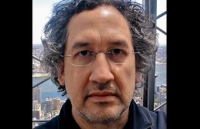
Michael Montes is a Peruvian-American composer for films, album projects and all other media.Michael Montes was born in Houston, Texas, the son of American nurse Anne Pryor and Peruvian doctor Mario Montes who came to the United States in the early fifties. The family eventually settled in Eden, NY.He began piano studies at age seven, quit in frustration with his teacher's methods, returned feverishly at age thirteen and later dropped out of medical school in order to pursue composition as his life's work.As a child his first film music experience occurred while watching the Jules Verne classic Mysterious Island. Years later he discovered that Bernard Herrmann had composed the score.Later on Pink Floyd became an influence, specifically their innovative production techniques and use of hallucinatory textures.
Artie Butler

Arthur Butler is an American arranger, songwriter, and session musician. In a long career, he has been involved in numerous hit records and other recordings, and has been awarded over 60 gold and platinum albums.
Ludwig van Beethoven

Ludwig van Beethoven (/ˈlʊdvɪɡ væn ˈbeɪt(h)oʊvən/ (About this soundlisten); German: (About this soundlisten); baptised 17 December 1770 – 26 March 1827) was a German composer and pianist. A crucial figure in the transition between the classical and romantic eras in classical music, he remains one of the most recognized and influential musicians of this period, and is considered to be one of the greatest composers of all time.
Beethoven was born in Bonn, the capital of the Electorate of Cologne, and part of the Holy Roman Empire. He displayed his musical talents at an early age and was vigorously taught by his father Johann van Beethoven, and was later taught by composer and conductor Christian Gottlob Neefe. At age 21, he moved to Vienna and studied composition with Joseph Haydn. Beethoven then gained a reputation as a virtuoso pianist, and was soon courted by Prince Lichnowsky for compositions, which resulted in Opus 1 in 1795.
Beethoven was born in Bonn, the capital of the Electorate of Cologne, and part of the Holy Roman Empire. He displayed his musical talents at an early age and was vigorously taught by his father Johann van Beethoven, and was later taught by composer and conductor Christian Gottlob Neefe. At age 21, he moved to Vienna and studied composition with Joseph Haydn. Beethoven then gained a reputation as a virtuoso pianist, and was soon courted by Prince Lichnowsky for compositions, which resulted in Opus 1 in 1795.
Randall Stroope

Z. Randall Stroope is one of the most active choral conductors and composers working in the United States today, with recent conducting engagements at the American School in Singapore, Canterbury Cathedral, England, Salzburger Dom in Salzburg, Washington National Cathedral, Vancouver Symphony, Lincoln Center, and Carnegie Hall. His compositions sell over 200,000 copies a year, and are performed regularly by esteemed ensembles throughout the world. Dr. Stroope has personally conducted/recorded 13 professional compact discs, and recordings of his music are heard frequently on radio and television broadcasts across the United States.
Franz Liszt

Franz Liszt (Hungarian: Ferencz Liszt, in modern usage Ferenc Liszt, from 1859 to 1865 officially Franz Ritter von Liszt) (October 22, 1811 – July 31, 1886) was a Hungarian composer, virtuoso pianist and teacher. He was also the father-in-law of Richard Wagner. In 1865 he became abbot in the Roman Catholic Church.
Liszt became renowned throughout Europe during the 19th century for his great skill as a performer. He was said by his contemporaries to have been the most technically advanced pianist of his age and perhaps the greatest pianist of all time. He was also an important and influential composer, a notable piano teacher, a conductor who contributed significantly to the modern development of the art, and a benefactor to other composers and performers, notably Richard Wagner, Hector Berlioz, Camille Saint-Saëns, Edvard Grieg and Alexander Borodin.
As a composer, Liszt was one of the most prominent representatives of the "Neudeutsche Schule" ("New German School"). He left behind a huge and diverse body of work, in which he influenced his forward-looking contemporaries and anticipated some 20th-century ideas and trends. Some of his most notable contributions were the invention of the symphonic poem, developing the concept of thematic transformation as part of his experiments in musical form and making radical departures in harmony.
Liszt became renowned throughout Europe during the 19th century for his great skill as a performer. He was said by his contemporaries to have been the most technically advanced pianist of his age and perhaps the greatest pianist of all time. He was also an important and influential composer, a notable piano teacher, a conductor who contributed significantly to the modern development of the art, and a benefactor to other composers and performers, notably Richard Wagner, Hector Berlioz, Camille Saint-Saëns, Edvard Grieg and Alexander Borodin.
As a composer, Liszt was one of the most prominent representatives of the "Neudeutsche Schule" ("New German School"). He left behind a huge and diverse body of work, in which he influenced his forward-looking contemporaries and anticipated some 20th-century ideas and trends. Some of his most notable contributions were the invention of the symphonic poem, developing the concept of thematic transformation as part of his experiments in musical form and making radical departures in harmony.
Liszt

Franz Liszt (October 22, 1811 – July 31, 1886) was a Hungarian composer, virtuoso pianist and teacher.
Liszt became renowned throughout Europe for his great skill as a performer; to this day, many consider him to have been the greatest pianist in history. He was also an important and influential composer, a notable piano teacher, a conductor who contributed significantly to the modern development of the art, and a benefactor to other composers and performers, notably Richard Wagner and Hector Berlioz.
As a composer, Liszt was one of the most prominent representatives of the "Neudeutsche Schule" ("New German School"). He left behind a huge and diverse oeuvre, in which he influenced his forward-looking contemporaries and anticipated some 20th-century ideas and trends. Some of his most notable contributions were the invention of the symphonic poem, developing the concept of thematic transformation as part of his experiments in musical form and making radical departures in harmony.
Liszt has most frequently been credited to have been the first pianist who gave concerts with programs consisting only of solo pieces. An example is a concert he gave on March 9, 1839, at the Palazzo Poli in Rome. Since Liszt could not find singers who — following the usual habit of the time — should have completed the program, he played four numbers all alone.
Liszt was a prolific composer. Most of his music is for the piano and much of it requires formidable technique.In his most famous and virtuosic works, he is the archetypal Romantic composer. Liszt pioneered the technique of thematic transformation, a method of development which was related to both the existing variation technique and to the new use of the Leitmotif by Richard Wagner. Liszt's piano works are usually divided into two classes. On the one hand, there are "original works", and on the other hand "transcriptions", "paraphrases" or "fantasies" on works by other composers.
Liszt became renowned throughout Europe for his great skill as a performer; to this day, many consider him to have been the greatest pianist in history. He was also an important and influential composer, a notable piano teacher, a conductor who contributed significantly to the modern development of the art, and a benefactor to other composers and performers, notably Richard Wagner and Hector Berlioz.
As a composer, Liszt was one of the most prominent representatives of the "Neudeutsche Schule" ("New German School"). He left behind a huge and diverse oeuvre, in which he influenced his forward-looking contemporaries and anticipated some 20th-century ideas and trends. Some of his most notable contributions were the invention of the symphonic poem, developing the concept of thematic transformation as part of his experiments in musical form and making radical departures in harmony.
Liszt has most frequently been credited to have been the first pianist who gave concerts with programs consisting only of solo pieces. An example is a concert he gave on March 9, 1839, at the Palazzo Poli in Rome. Since Liszt could not find singers who — following the usual habit of the time — should have completed the program, he played four numbers all alone.
Liszt was a prolific composer. Most of his music is for the piano and much of it requires formidable technique.In his most famous and virtuosic works, he is the archetypal Romantic composer. Liszt pioneered the technique of thematic transformation, a method of development which was related to both the existing variation technique and to the new use of the Leitmotif by Richard Wagner. Liszt's piano works are usually divided into two classes. On the one hand, there are "original works", and on the other hand "transcriptions", "paraphrases" or "fantasies" on works by other composers.
Gerard Hengeveld
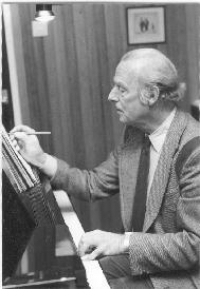
Gerard Hengeveld (December 7, 1910 in Kampen – October 28, 2001 in Bergen, North Holland) was a Dutch classical pianist, music composer and educationalist. He is especially known for his compositions of study material for piano. Other compositions include two piano concertos, a violin sonata, and a sonata for cello. Hengeveld was an able interpreter and performer of the music of Bach for piano and harpsichord. He gave regular concerts in the Concertgebouw in Amsterdam. Some of his concerts were captured on record. Hengeveld was a professor at the Royal Conservatory of The Hague. Amongst his students was Dutch pianist and musicologist Frans Bouwman.
Big O

Big O Musical artist EPs: Freiheit, Parking Violations EP (Instrumentals), MORE Genre: Latin Urbano, Hip-Hop/Rap
Songs Loco Contigo Loco Contigo · 2022Por Paloma Por Paloma (feat. Chael Produciendo) · 2019 Cotorra Por Aduana
Cotorra Por Aduana · 2021.
Songs Loco Contigo Loco Contigo · 2022Por Paloma Por Paloma (feat. Chael Produciendo) · 2019 Cotorra Por Aduana
Cotorra Por Aduana · 2021.
Timothy Loest

"Timothy Loest is an ASCAP award-winning composer, conductor, and music educator. His compositions and arrangements are performed worldwide and his pedagogical methods and conducting appearances impact performers and audiences at the state and...
Roxette

Roxette is a Swedish pop duo, consisting of Marie Fredriksson and Per Gessle.
Although well known as a duo in their native Sweden since the mid 1980s (where the group has had 17 Top 10 hits), the duo achieved worldwide success in the late 1980s. Roxette had four US No. 1 singles, two No. 2 singles. The group has been certified by the Recording Industry Association of America (RIAA) with two platinum albums - 1988's Look Sharp! (released in the U.S. in 1989) and 1991's Joyride, as well as two gold singles - "The Look" and "It Must Have Been Love".
Roxette's success was even bigger in Europe and South America, where their number of Top 10 hits was higher and continued after their decline in the US in 1992. Each of their 7 studio albums as well as their several "Best of" CDs received gold, platinum or multi-platinum status in Europe and Latin-America.
Although well known as a duo in their native Sweden since the mid 1980s (where the group has had 17 Top 10 hits), the duo achieved worldwide success in the late 1980s. Roxette had four US No. 1 singles, two No. 2 singles. The group has been certified by the Recording Industry Association of America (RIAA) with two platinum albums - 1988's Look Sharp! (released in the U.S. in 1989) and 1991's Joyride, as well as two gold singles - "The Look" and "It Must Have Been Love".
Roxette's success was even bigger in Europe and South America, where their number of Top 10 hits was higher and continued after their decline in the US in 1992. Each of their 7 studio albums as well as their several "Best of" CDs received gold, platinum or multi-platinum status in Europe and Latin-America.
Brian Eno

Brian Eno is a British composer, producer, keyboardist and singer, who helped many popular bands of the 1980s and 90s discover new sounds and created the ambient genre. Instrument: Keyboard; human voice; Saxophone; Guitar; Bass guitar
Vivaldi

Antonio Lucio Vivaldi (March 4, 1678 â July 28, 1741), nicknamed il Prete Rosso ("The Red Priest"), was a Venetian priest and Baroque music composer, as well as a famous virtuoso violinist; he was born and raised in the Republic of Venice. The Four Seasons, a series of four violin concerti, is his best-known work and a highly popular Baroque piece.
Many of Vivaldi's compositions reflect a flamboyant, almost playful, exuberance. Most of Vivaldi's repertoire was rediscovered only in the first half of the 20th century in Turin and Genoa and was published in the second half. Vivaldi's music is innovative, breaking a consolidated tradition in schemes; he gave brightness to the formal and the rhythmic structure of the concerto, repeatedly looking for harmonic contrasts and innovative melodies and themes. Moreover, Vivaldi was able to compose nonacademic music, particularly meant to be appreciated by the wide public and not only by an intellectual minority. The joyful appearance of his music reveals in this regard a transmissible joy of composing; these are among the causes of the vast popularity of his music. This popularity soon made him famous in other countries such as France which was, at the time, very independent concerning its musical taste.
Vivaldi is considered one of the composers who brought Baroque music (with its typical contrast among heavy sonorities) to evolve into a classical style. Johann Sebastian Bach was deeply influenced by Vivaldi's concertos and arias (recalled in his Johannes Passion, Matthäuspassion, and cantatas). Bach transcribed a number of Vivaldi's concerti for solo keyboard, along with a number for orchestra, including the famous Concerto for Four Violins and Violoncello, Strings and Continuo (RV 580).
Many of Vivaldi's compositions reflect a flamboyant, almost playful, exuberance. Most of Vivaldi's repertoire was rediscovered only in the first half of the 20th century in Turin and Genoa and was published in the second half. Vivaldi's music is innovative, breaking a consolidated tradition in schemes; he gave brightness to the formal and the rhythmic structure of the concerto, repeatedly looking for harmonic contrasts and innovative melodies and themes. Moreover, Vivaldi was able to compose nonacademic music, particularly meant to be appreciated by the wide public and not only by an intellectual minority. The joyful appearance of his music reveals in this regard a transmissible joy of composing; these are among the causes of the vast popularity of his music. This popularity soon made him famous in other countries such as France which was, at the time, very independent concerning its musical taste.
Vivaldi is considered one of the composers who brought Baroque music (with its typical contrast among heavy sonorities) to evolve into a classical style. Johann Sebastian Bach was deeply influenced by Vivaldi's concertos and arias (recalled in his Johannes Passion, Matthäuspassion, and cantatas). Bach transcribed a number of Vivaldi's concerti for solo keyboard, along with a number for orchestra, including the famous Concerto for Four Violins and Violoncello, Strings and Continuo (RV 580).
Hanson

Hanson is an American pop rock band formed in Tulsa, Oklahoma by brothers Isaac, Taylor, and Zac Hanson. They are best known for the 1997 hit song "MMMBop" from their major label debut album Middle of Nowhere that earned three Grammy nominations. Despite the enormous commercial success of Middle of Nowhere, the band departed from Mercury Records and then eventually from Island Def Jam Music Group after conflict with the label about creative input. The band now records under its own label, 3CG Records.
 Sheet Music Max is a site for those who wants to access popular sheet music easily,
letting them download the sheet music for free for trial purposes.
It's completely free to download and try the listed sheet music, but you have to delete the files after 24 hours of trial.
Don't forget, if you like the piece of music you have just learned playing,
treat the artist with respect, and go buy the original sheet music.
Sheet Music Max is a site for those who wants to access popular sheet music easily,
letting them download the sheet music for free for trial purposes.
It's completely free to download and try the listed sheet music, but you have to delete the files after 24 hours of trial.
Don't forget, if you like the piece of music you have just learned playing,
treat the artist with respect, and go buy the original sheet music.